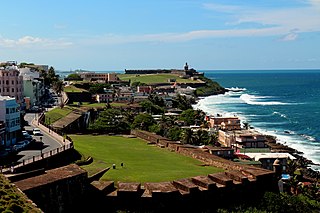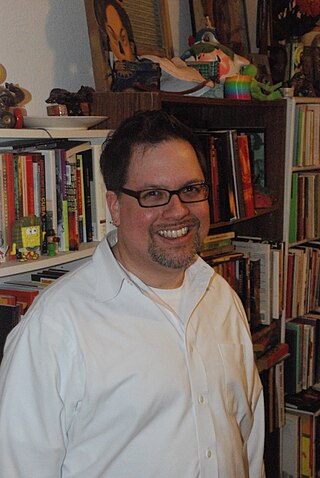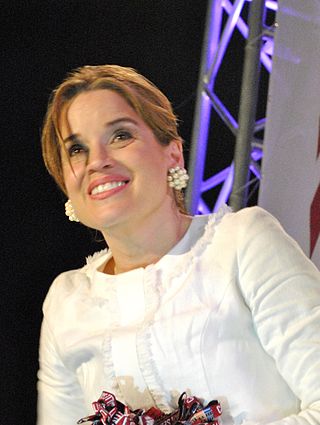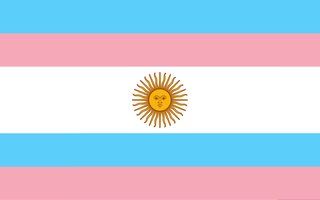
San Juan is the capital city and most populous municipality in the Commonwealth of Puerto Rico, an unincorporated territory of the United States. As of the 2020 census, it is the 57th-largest city under the jurisdiction of the United States, with a population of 342,259. San Juan was founded by Spanish colonists in 1521, who called it Ciudad de Puerto Rico.

Humacao is a city and municipality in Puerto Rico located in the eastern coast of the island, north of Yabucoa; south of Naguabo; east of Las Piedras; and west of Vieques Passage. Humacao is spread over 12 barrios and Humacao Pueblo. It is part of the San Juan-Caguas-Guaynabo Metropolitan Statistical Area.

María de Lourdes Santiago Negrón is a Puerto Rican lawyer and politician from Adjuntas. She is the current vice-president of the Puerto Rican Independence Party (PIP) and in 2004 became the first woman from that party to be elected into the Senate in the history of Puerto Rico. She currently serves as Senator at-large at the Puerto Rico Senate after being elected in 2020 with the most votes of any candidate.

The following is an alphabetical list of articles related to the Commonwealth of Puerto Rico.

Puerto Rican literature is the body of literature produced by writers of Puerto Rican descent. It evolved from the art of oral storytelling. Written works by the indigenous inhabitants of Puerto Rico were originally prohibited and repressed by the Spanish colonial government.

Lesbian, gay, bisexual, transgender (LGBT) persons in Puerto Rico have almost the same protections and rights as heterosexual individuals. Public discussion and debate about sexual orientation and gender identity issues has increased, and some legal changes have been made. Supporters and opponents of legislation protecting the rights of LGBT persons can be found in both of the major political parties. Public opposition still exists due, in large part, to the strong influence of the Roman Catholic Church, as well as socially conservative Protestants. Puerto Rico has a great influence on the legal rights of LGBT citizens. Same-sex marriage has been legal in the commonwealth since July 2015, after the U.S. Supreme Court ruled in the case of Obergefell v. Hodges that same-sex marriage bans are unconstitutional.

Lawrence La Fountain-Stokes is a gay Puerto Rican author, scholar, and performer. He is better known as Larry La Fountain. He has received several awards for his creative writing and scholarship as well as for his work with Latino and lesbian, gay, bisexual, and transgender (LGBT) students. He currently resides in Ann Arbor, Michigan.

Manuel Ramos Otero was a Puerto Rican writer. He is widely considered to be the most important openly gay twentieth-century Puerto Rican writer who wrote in Spanish, and his work was often controversial due to its sexual and political content. Ramos Otero died in San Juan, Puerto Rico, due to complications from AIDS.
Pedro Julio Serrano is an openly gay and HIV+ human rights activist and president of Puerto Rico Para Todes, a non-profit LGBTQ+ and social justice advocacy organization founded in 2003. He is a former advisor to former New York City Council Speaker Melissa Mark Viverito and to former San Juan Mayor Carmen Yulín Cruz. He also served, for more than three years, as executive director of Programa Vida and Clínica Transalud of the Municipality of San Juan. He now works as Director of Public Affairs at Waves Ahead.

Carmen Yulín Cruz Soto is a Puerto Rican politician who served as mayor of the city of San Juan, Puerto Rico from 2013 to 2020. From 2009 through 2013, Cruz served in the House of Representatives of Puerto Rico.

Mala Mala is a 2014 Puerto Rican documentary film directed by Antonio Santini and Dan Sickles, starring Jason "April" Carrión, Samantha Close and Ivana Fred. The film shows several stories of the transgender community in Puerto Rico, including April Carrion, a well-known drag queen who participated in the reality show RuPaul's Drag Race. Mala Mala also includes the historic victory of the LGBT community with the approval and signature of Law 238-2014, which prevents discrimination in employment based on sexual orientation and/or gender identity. Mala Mala has been presented in festivals around the world, including London, Ukraine, Los Angeles, Austin, Costa Rica and Mexico, in addition to schools such as The Boston Conservatory at Berklee, University of Pennsylvania, New York University and Harvard University.

Transgender and travesti rights in Argentina have been lauded by many as some of the world's most progressive. The country "has one of the world's most comprehensive transgender rights laws": its Gender Identity Law, passed in 2012, made Argentina the "only country that allows people to change their gender identities without facing barriers such as hormone therapy, surgery or psychiatric diagnosis that labels them as having an abnormality". In 2015, the World Health Organization cited Argentina as an exemplary country for providing transgender rights. Leading transgender activists include Lohana Berkins, Diana Sacayán, Mariela Muñoz, María Belén Correa, Marlene Wayar, Claudia Pía Baudracco, Susy Shock and Lara Bertolini.

LGBT in Argentina refers to the diversity of practices, militancies and cultural assessments on sexual diversity that were historically deployed in the territory that is currently the Argentine Republic. It is particularly difficult to find information on the incidence of homosexuality in societies from Hispanic America as a result of the anti-homosexual taboo derived from Christian morality, so most of the historical sources of its existence are found in acts of repression and punishment. One of the main conflicts encountered by LGBT history researchers is the use of modern concepts that were non-existent to people from the past, such as "homosexual", "transgender" and "travesti", falling into an anachronism. Non-heterosexuality was historically characterized as a public enemy: when power was exercised by the Catholic Church, it was regarded as a sin; during the late 19th and early 20th centuries, when it was in the hands of positivist thought, it was viewed as a disease; and later, with the advent of civil society, it became a crime.
Crime in Puerto Rico describes acts of violent and non-violent crime that take place within the Commonwealth of Puerto Rico.

Kevin Fret Rodríguez was a Puerto Rican rapper, singer and the first openly gay male Latin trap artist. He was known for his gender-variant looks.

Nellys Rocio Pimentel Campusano is a Puerto Rican model and beauty queen who was crowned Miss Earth 2019. She became the first-ever Puerto Rican and Caribbean woman to win Miss Earth.
Bárbara "Soraya" Santiago Solla was a pioneer of the transgender community in Puerto Rico as well as the first person in Puerto Rico to change the gender designation on their birth certificate following gender reassignment surgery.
Loverbar was a queer bar, restaurant and nightclub located in Río Piedras, San Juan, Puerto Rico. As a queer club it was the first of its kind in Puerto Rico, with Refinery29 calling it "the queer destination for everything exciting, progressive, and radical about the Puerto Rican queer scene." It opened in 2020 and announced its closure at the end of 2021.
Christina Hayworth was an American AIDS and transgender rights activist and journalist. Born in Humacao, Puerto Rico, Hayworth focused most of her work in New York and Puerto Rico. She was a colonel in the US Army, where she was a part of the US occupation of Vietnam. Hayworth was present at the Stonewall riots of 1969 and became a Stonewall Veterans Association (SVA) ambassador to Latin America.

















